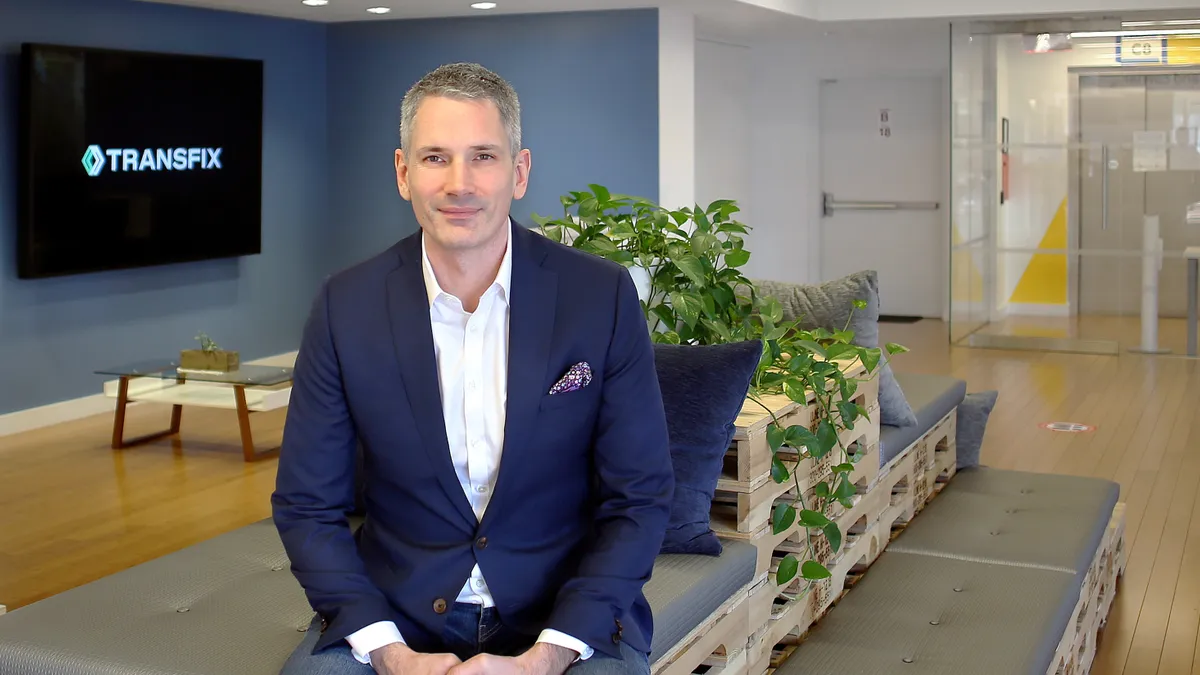In January, transportation solutions provider Transfix hired former WeWork CFO Christian Lee as its finance chief in an effort to bolster its growth and expand its services.
Though a newcomer to the supply chain space, Lee brings experience in M&A, corporate development and scaling start-ups.
“As I was looking around for the next opportunity, I was really focused on companies that were accelerating into the next phase of growth: proven product market fit that needed someone with my capabilities to take it to the next level,” Lee told CFO Dive Tuesday.
“This is such a fascinating time in the supply chain industry,” he said. "There’s a much larger recognition now that all the things Transfix is building, whether that’s reliability, transparency, or getting more waste out of the supply chain, we’ll completely transform the industry, and I’m just super excited to be a part of it.”
In his first three months on the job, Lee has come to see trucking, when logistics and software components are included, is a near-trillion dollar industry. But there has been surprisingly little innovation and tech and automation, he said.
He was drawn to Transfix’s vision of where the industry was headed and what it could do with its operational discipline to create a better ecosystem.
“One of the big lessons from 2020 is how important supply chain really is,” he said. “I think it had been in the background for a lot of people, but I think we all now recognize there's a far bigger story here. Transfix is using tech to create less waste and more transparency and reliability.”
Transfix, at its core, is a marketplace that uses data automation and machine learning to match shippers with carriers in the most cost-efficient way possible.
M&A background
Lee began his career as an analyst at Citigroup before moving into M&A leadership at Time Warner, pre-spinoff into Warner Media.
“The first 15 to 17 years of my career were at very large companies,” he said. “At Time Warner, we bought a large company called Adelphia, and then merged into Time Warner Cable.”
Lee joined Time Warner Cable as it was preparing to spin off from Time Warner Inc. He was there through the spinoff, its journey as a public company and its merger with Charter in 2015, which resulted in 1,000% share price appreciation over 8 years. He held a number of leadership roles during that time, including in treasury and corporate development.
“I saw the whole life cycle of that company,” he said. “There were lots of lessons there about how to expand. In the supply chain, lots of M&A will happen: there are lots of partnerships in the ecosystem, and massive changes are coming."
In the second and third quarters of 2020, the supply chain “literally stopped moving,” he said. Then came the rise in e-commerce. “Transfix really benefited from all that pent-up demand as things started moving,” he said.
Lessons from WeWork
In 2015, Lee became CFO of WeWork, the high-profile collaborative office space start-up, while it was experiencing explosive growth.
As WeWork’s CFO, Lee worked closely with Artie Minson, its president and COO. Minson, who had been CFO of AOL and Time Warner Cable, collaborated with Lee on most initiatives, Lee said.
“I had the challenge of building out the entire finance function at a company that was growing incredibly quickly,” Lee said. “I did it with Artie, who had been a big public-company CFO. It was a great experience of scaling a business, and putting in place all those systems.”
In 2017, Lee pivoted from CFO to managing director of WeWork’s Asian expansion, as vice-chair of WeWork Asia. After moving to Shanghai for the role, he left the company in mid-2020.
He entered the WeWork job with nearly 20 years of M&A experience at large companies; WeWork was entirely different, he said.
“It was incredibly high-growth, and I had to build a lot of functions from scratch, manage incredible international expansion and bring capital and people together to grow the organization,” he said. “That combination of skills, and seeing what something looks like at scale, how large companies execute, what drives them: I bring all of that now to Transfix, a company that’s growing so quickly and has such a massive market ahead of it.”
The year after Lee left the CFO seat, WeWork lost $2 billion. The company, which at its peak was valued at $47 billion, pulled its S-1 filing and put its plans to go public on hold. At the time, The Wall Street Journal reported, it was "besieged with criticism over its governance, business model, and ability to turn a profit."
A month later, founder Adam Neumann resigned as CEO and relinquished his majority voting control in the company. Under new management, the company has since shared plans to go public through a SPAC merger later this year.
Changed role
What drew Lee to Transfix, a supply chain company, from the shared office space realm, was its combination of high growth, big vision, large opportunity, and “very strong operational cadence,” he said.
Balancing long-term aspirations with day-to-day work is difficult to pull off, he said.
“There are lots of companies that have a big vision and a big market, but are they good at day-to-day execution?” he said. “How do you have a big vision and big market and break that down into bite-sized chunks teams can understand?”
Great companies, throughout history, he said, have a combination of a very big vision for the next five to ten years, and solid translation, so everyone on the team can get there on a day-to-day basis.
Early priorities
The first thing any leader does when they come in is bring in other key leaders who can help put more processes in place to scale over the short and long-term, he said.
Working in corporate development provides an interesting vantage point of the company, in Lee’s experience.
“One of the things you have to be good at is evaluating a new industry,” he said. “You have to be able to understand a new industry, its operations, and how it will make the company you’re working with or acquiring better, and where those synergies will come from.”
His path to the CFO seat, which included M&A deals with start-ups and legacy institutions, was “super helpful,” he said. At Transfix, he’s “trying to bring all that [experience] to bear for a company with so much growth potential.”
All hopeful CFOs should seek out a variety of leadership experiences, he added. “U.S., international, corporate finance, all those things are so important,” he said. “And they can lead to a broader conversation of how to scale and grow.”
Lee began at Transfix in January. In his first 90 days, he's focused on aligning with the rest of the C-suite on plans for expansion.
“Where do we want to take some big bets? We’ve just launched two new software products: what are we doing to invest in those?” he said, adding that he’s prioritizing healthy management of P&L and the balance sheet.
“We have to spend wisely, but also invest in some key areas that will drive growth,” he said. “The digital marketplace is growing incredibly well; we want to continue investing in these other areas, including the other products we’ll be launching.”






















